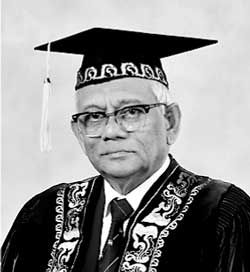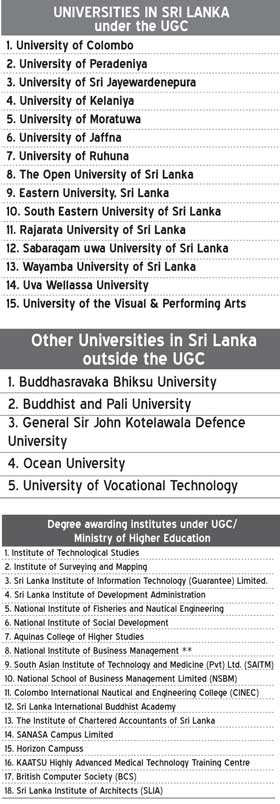Reply To:
Name - Reply Comment
Last Updated : 2024-04-25 10:47:00
An excerpt from the memorial oration in memory of Emeritus Prof. J. N. Oleap Fernando’s second death anniversary delivered by Vidya Jyothi Emeritus Prof. Dayantha Wijeyesekera
I am sure we are all concerned about the current crises in the country on tertiary education. I would say that this is mainly due to some decision-makers lacking the clear understanding and moreover not abiding by laid down procedures.
Quality and relevance in tertiary education
In order to focus on the main topic of this oration which I feel is currently very topical to the crises in tertiary education which have surfaced, it would be prudent to indicate how both Prof. J. N. Oleap Fernando (JNO) and I diversified and promoted alternative paths in addition to the traditional routes in tertiary education.

The two key words are ‘Quality’ and ‘Relevance’ both of which have to be borne in mind and imperative when planning tertiary education at any level. For an example, professional tertiary education such as Medicine, Engineering, Accountancy, Architecture etc either through State or non-govt. institutes, fee-levying or non fee-levying are much relevant and essential for the development needs of the country and of course the quality of these courses should be academically ensured by the ‘Quality Assurance Authorities’ and the respective ‘Professional Bodies’ should decide on the suitability of the persons to practise in Sri Lanka.
As a matter of fact, the University of Moratuwa having been headed by a world famous space scientist Sir Arthur C. Clarke for several years as its Chancellor, and also NASA said to be attracting Sri Lankans for employment there, said to be 10% of staff are Sri Lankans, could have thought of a Space Technology course, but would it be relevant at this point of time for Sri Lanka.
Alternative avenues 
The slide shows the many alternative avenues should be available in the country. Prof. JNO and I once again came together through this topic when I was appointed the Vice Chancellor of the Open University of Sri Lanka, and very soon he became the Dean of the Faculty of Natural Sciences. This was at a time when it was considered ridiculous to consider Science and Engineering Technology degrees through Open and Distance Learning (ODL).
We could confidently say that JNO and I along with the unstinting support of the other academic and administrative staff were able to scientifically engineer the two degree programmes to successfully conduct the first ODL degrees in the world in these disciplines. The operations at an ODL university have to be different from a conventional university with deadlines and time targets having to be kept, which JNO did meticulously, setting an example to both staff and students.
This may be the reason why JNO, while being the Prof. of Chemistry at OUSL, wanted to strengthen his skills and knowledge in Management and also Law by pursuing the courses of study at the same university. But due to academic conflict of interests the pursuance of the Law degree was not possible.
While there has always been resistance to fee levying in tertiary education it was possible as from the 1980s to very gently and tactfully impose a fee at the state Open University of Sri Lanka, as it was mainly for cost recovery purposes to supplement the grant from the Treasury. This has been done previously in another state institute involved in Business Management recovering cost on a similar basis. The success of its performance is evident from the upgrading of it to a degree-awarding status as a school of Business Management.
Fee-levying in tertiary education; whether through State or non-govt. institutions may be essential for the purpose of supplementing a grant to maintain quality, services and above all standards. It should, however, not be encouraged for commercial profit making purposes, fleecing the students.
Overseas qualifications
Overseas qualifications are also debated in many for a not realising the beginnings of same. Historically, there have been foreign universities and international qualifications being awarded before local degrees and other professional qualifications were available in the country. They are such as those which were offered by the University of London as external degrees, the University of Saskachewan in Canada.
However, on their return to the country, those with overseas qualifications had to get their qualifications approved by the respective professional bodies to permit them to practise their professions locally.
As long as the degrees being offered by the foreign universities have the formal approval of the respective academic authorities of such universities, such as their respective Senates and Councils this would be acceptable as at present. But if they are professional degrees, the practice of the profession here would depend solely on the accreditation and acceptance of those professional degrees by the relevant local professional bodies. Considering university education, currently there are 15 conventional universities, including the Open University operating under the UGC.
Degree-awarding institutes
Then we have degree-awarding institutes. At present, there are about 18 such institutes, though not termed ‘universities’, approved by the UGC under the provisions of the Universities Act.
It has to be carefully noted that unlike in fully-fledged universities, the degree-awarding status is granted for each specific programme of study and not at once to all the programmes in an institute. This is sometimes misinterpreted and misrepresented. For example, when a degree in Management is accredited in a degree awarding-institute, it does not mean that a degree in Medicine or Engineering is also automatically accredited by the UGC or the respective local professional body.
Relevance, recognition, registration and accreditation
These aspects are of paramount importance in tertiary education. They should be considered from economic, academic, professional and somewhat political points of view purely for geographic reasons. Quality assurance needs to be carried out on a regular basis. These aspects should be verified for each discipline of study in the institute.
Relevance
A programme of study however attractive, novel, or popular it may be, if it is not relevant to the needs of industry and the country, it is necessary to be cautious in commencing and / or continuing same. This could be done through various market/needs surveys and determination of Human Resources Development (HRD). The establishment of an institute and the connected infrastructure would have to be economically justified.
Recognition
The criteria for recognition should be rational. The membership of an association granted merely on the payment of an annual subscription may not be the best measure of recognition of a foreign university or institute. There are reputed foreign and local universities and institutes not listed in the members’ list merely because they have not paid their subscriptions and some inferior tertiary institutes get the recognition just because of the annual subscriptions they have paid.
Registration
There should be a stringent process for registration of a tertiary institute. This should be determined by the infrastructure facilities, staff resources, public utilities and services. The registration of an institute does not mean that a particular programme of study conducted there is accredited.
Accreditation
This is an exercise which has to be undertaken by experts in the subject area and determined by rigid criteria. Accreditation has to be regularly updated and done for each course of study.
Whither tertiary education
What really is tertiary education? The Chart shows the macro scenario in tertiary education. It covers a very wide spectrum and usually defined as post secondary school education, including vocational, academic and professional education and training.
Prof. Fernando, being an eminent academic as well as a professional, not only promoted academic undergraduate, postgraduate and professional education, but also highlighted the need and importance of vocational education and training and established training courses for laboratory technicians at the Institute of Chemistry.
Finally, while diversification of relevant tertiary education and training is essential to meet the development needs of the country, a clear understanding of the subtle differences and the interaction between these three sub-sectors in tertiary education and training, viz vocational, academic and professional, should be realized in order to maintain academic standards and professional ethics and practice. This applies not only to medicine, but also to other leading professions such as accountancy, architecture, chemical sciences, engineering, law etc. Such efforts would avoid and defuse crises, prevent unnecessary provocations and facilitate the development efforts of those who love the motherland, by utilizing the knowledge they possess and gain at all levels for the betterment of the country.

Add comment
Comments will be edited (grammar, spelling and slang) and authorized at the discretion of Daily Mirror online. The website also has the right not to publish selected comments.
Reply To:
Name - Reply Comment
US authorities are currently reviewing the manifest of every cargo aboard MV
On March 26, a couple arriving from Thailand was arrested with 88 live animal
According to villagers from Naula-Moragolla out of 105 families 80 can afford
Is the situation in Sri Lanka so grim that locals harbour hope that they coul